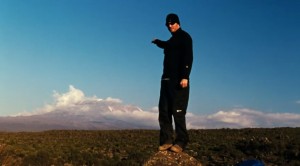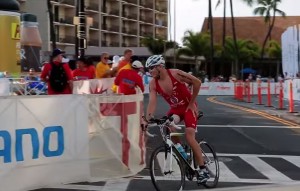 Everyone has different motivations in life. Some people are motivated by money, their faith or a goal they set for themselves.
Everyone has different motivations in life. Some people are motivated by money, their faith or a goal they set for themselves.
Bonner Paddock’s motivations aren’t so easy to sum up. Born with cerebral palsy and once told that he wouldn’t live past the age of 20, Paddock has become an expert at setting goals for himself. Summit Mt. Kilimanjaro? Check. Finish the Ironman Triathlon in Kona, Hawaii? Check. Write a book? Check.
For living a life that inspires countless people with and without cerebral palsy, and for the way his actions and accomplishments motivate others to push the limits of their potential, Bonner Paddock is the latest recipient of The Oshman Firm’s I Define Me Award.
Working Twice as Hard
As a child, Paddock wasn’t exactly sure what was wrong with him. He just knew his legs didn’t work like the other kids’. He was a frustrated child who sometimes threw tantrums after falling down because his legs weren’t keeping up with what his brain wanted them to do. In typical brother fashion, his brothers didn’t cut him any slack if he couldn’t keep up with whatever they were doing.
In these early days, Paddock realized he had to work twice as hard as others to do the same thing.
Young boys love to play sports, and young Paddock found creative ways to be a valuable member of any team. Whether it was becoming a switch-hitter in baseball, the goalie on the soccer team or a three-point sniper in basketball, he found ways to practice and be included.
“I’ve got to give Bonner credit,” his brother Mike told the Orange County Register. “He never gave up no matter what the doctors said.”
It’s a good thing he didn’t always listen to the doctors. Throughout his childhood, Paddock was given many different diagnoses. All of them were incorrect. Doctors tried to cure his legs with walking therapies, braces, flat-soled saddle shoes and lower-body casts.
On his eleventh birthday, one doctor incorrectly diagnosed Paddock with degenerative syringomyelia, saying that he’d be in a wheelchair by age 15 and dead by 20. Finally, another doctor correctly diagnosed him with cerebral palsy.
Compared to the first diagnosis, this was amazing news to Paddock: “I felt like I got my life back,” he recalled.
Learning Not to Hide
Despite his gladness at having a less dire condition than his doctors originally believed, for most of his early adult life, Paddock tried to distance himself from cerebral palsy. He would hide it and use humor to make light of situations that belied his truth. A visit to the Orange County chapter of United Cerebral Palsy ultimately changed his view. His heart was touched by the children there and he soon began competing in races to raise money for charitable causes.
Training for and running in races brought Paddock into a community of people who refused to see cerebral palsy as a limitation, and instead used it to motivate themselves to great things. One such person Paddock met was Steve Roberts, a father who ran on behalf of his son who had cerebral palsy. Paddock and Roberts began training together for the Orange County Marathon to raise funds for United Cerebral Palsy’s Life Without Limits center.
Paddock says that Roberts’ example “lit a fire” in him. He knew that he could not only move beyond being defined by his condition, but actually use it as a way to help himself and help others. This has led Paddock that led to some truly remarkable exploits…not just for someone with cerebral palsy, but for anyone.
‘The Furnace Began to Roar’
In September 2008, Paddock began a weeklong trek up Mt. Kilimanjaro. Much like the father he had met in the racing community, Paddock was climbing the mountain on behalf of those with his condition who couldn’t climb. In fact, no one with cerebral palsy had ever summited the mountain unassisted.
The goal of the endeavor was to raise $250,000 to provide therapy for children with cerebral palsy. But the climb also served a deeper purpose for Paddock — to conquer his own fears.
“[The climb] encapsulated all of the things I feared most,” he told GrindTV. “With CP, you don’t have balance, really, and it affects your equilibrium. It was going to be a huge challenge getting to the summit in the darkness. I knew it wasn’t necessarily going to be a suicide mission, but it was really out of my physical realm.”
Paddock’s book One More Step is a fascinating look at the way trust, determination and even anger can fuel success. In one of the book’s most compelling passages, Paddock evocatively describes a crucial moment in his climb, and how he found the strength to go farther than he ever believed he could.
Twenty minutes into the climb, I was already a wreck, my balance off and my legs aching. … Terrified, I began shivering uncontrollably. I shook my numb hands and beat them against my thighs, hoping to get the blood moving. The only warmth I felt was from the burning pain in my ankles and legs. It was clear to me that if things did not improve, I would never make it the six additional hours it would take to get to the summit.
“I may not do this,” I mumbled quietly to myself. I thought about what that would mean for everybody who had supported me—my coworkers, my friends, and strangers who had donated to my cause. I thought of Jake Ryan, a four-year-old with cerebral palsy, to whom I’d dedicated my climb, and his family. They had faith in my ability to reach the top of Kilimanjaro. They believed in me. And I couldn’t betray that belief.
Somewhere—the hundredth switchback, the thousandth—the pain in my legs blew past anything I had ever known. With each step, my feet and ankles sent shock waves of agony. I wanted to cry, to sit down on a rock and weep. In a haze of frustration, I started to think of everyone who had ever doubted me. Of every jeer and joke. Of every time I was picked last for a team in soccer or basketball. The anger drove me on. I pictured a furnace fueled by these feelings. Throw in some logs.
I remembered getting into a fight in elementary school with a boy who’d teased me for my funny walk. I shouted at him, and he’d punched me in the stomach, knocking me down. I added it to the furnace.
I remembered all those visits to all those doctors. Walk here, bend there, the stab of needles. I remembered all the lies I had told when someone asked me why I was walking differently and all the girls who had probably never liked me because of my stork legs. I remembered those damn casts up to my hips.
The furnace started to roar.
With each step, I heaped another log onto the flame: the scrapes, bruises, broken bones, clumsy falls. The trail got even steeper. Digging my walking poles in, I pushed myself up another step. Then another.
Click here to read more of this selection from One More Step.
The Art of Not Giving Up
 After the Mt. Kilimanjaro climb, Paddock could have easily spent the rest of his life telling the story of that triumph. Instead, he set about training for his next mission: completing the Ironman Triathlon. Coached by Ironman legend Greg Welch, Paddock became the first person with cerebral palsy to ever complete sports’ toughest one-day event without assistance. (He even entered in the general competition, rather than the physically challenged division of the event.) In the process, he raised more than $700,000 for his OM Foundation, which raises awareness and builds support for early-learning centers for children with cerebral palsy.
After the Mt. Kilimanjaro climb, Paddock could have easily spent the rest of his life telling the story of that triumph. Instead, he set about training for his next mission: completing the Ironman Triathlon. Coached by Ironman legend Greg Welch, Paddock became the first person with cerebral palsy to ever complete sports’ toughest one-day event without assistance. (He even entered in the general competition, rather than the physically challenged division of the event.) In the process, he raised more than $700,000 for his OM Foundation, which raises awareness and builds support for early-learning centers for children with cerebral palsy.
Paddock says that completing this second monumental athletic feat was a very different experience from the Mt. Kilimanjaro climb a few years earlier.
“During my climb, I was doing everything from a fear-based place, chasing down the meaning of why I had this disability, still angry with my mom and dad,” he told GrindTV. “I hadn’t dealt with things in my life.”
By contrast, he says, his purpose during the Ironman was based in positivity, strength and personal growth. He wrote in MindBodyGreen:
“More than anything, I thought about how each day perseverance for me began the same way it would have even if I hadn’t been training for the race of my life: by getting out of bed and telling the pain that today wasn’t going to be the day it would stop me. The art of not giving up is just that, an art. It’s a personal creation, as individual as anything that hangs in a museum. It’s when things get hard that you learn about who you really are as a person.”
After 16.5 hours spent completing the 140-mile race through Kona, Hawaii, Paddock literally leapt over the finish line to an uproar of cheers and waving signs from his multitude of fans.
‘It All Starts With Getting Out of Bed’
These days, Paddock continues to work hard on behalf of the cerebral palsy community, inspiring and supporting those with CP and their loved ones as they take on their “personal Ironman” challenges. He is currently organizing a two-year program called the Team Jake Global Challenge. This program encourages anyone in the world to raise money for Team Jake Worldwide by completing a half marathon in 2015 and a full marathon in 2016. There are also events for cyclists.
Meanwhile, both the OM Foundation and One More Step continue to grow in popularity, serving the CP community by strengthening minds and spirits to fight the common perceptions of what people with cerebral palsy are capable of.
When asked how he found the strength to overcome his physical limitations in such spectacular fashion, Paddock says that “how” is the wrong question. He wrote in MindBodyGreen:
“The right question is ‘what’: What do you do when everything inside you says to stop? What do you do when the challenges of life push you to your limits? It all starts with getting out of bed.”
For one person, he adds, running two miles is a hard challenge, while for others it’s 10 miles, and for yet others, the distance from the bed to the bathroom is the hardest walk of all. The key is not to compare yourself to anyone else, and not to consider other people’s opinion of what you should (or should not) be able to do.
“Focusing on other people might get me over the next hill but it wasn’t going to get me across the finish line. Instead I had to run MY race. It was mine and it didn’t belong to anyone else. My pace, my goal, my challenge,” he wrote.
It’s easy to see why we at The Oshman Firm are very proud to highlight Bonner Paddock as our I Define Me award winner for this month.
If you know someone who deserves to be recognized for the way they redefine what it means to have cerebral palsy, feel free to get in touch with us and let us know.



